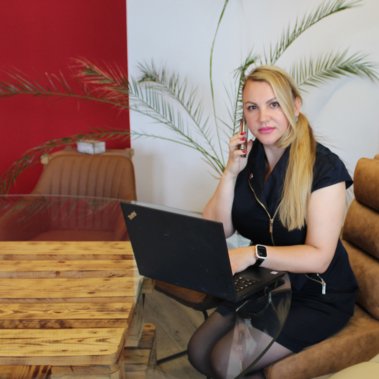Germany was a culture shock
“My mum was a successful warehouse manager,” laughs the 44-year-old woman. “My father was a pilot and studied engineering. Both were always my role models.” So it was no wonder that Klara, barely arrived in Germany, began studying business administration with a focus on logistics. “It was already hard. I first had to learn German and then I went through with my studies in a language that had been foreign to me until then. That cost me a lot of energy. But I really wanted to complete it successfully.” While still studying, she worked as a student assistant at a logistics company before she completed her studies in 2002, was taken on by the company and finally moved to MBS in 2008 together with her boss, Arne Lorenzen. “We went to MBS as a whole team because we all got along very well and worked great together. That hasn’t changed after thirteen years,” says Klara Boger.

MBS is a medium-sized company and the competition is strong, but we have even been able to poach some from large logistics players because of the way we deal with our customers. My recipe for success: We fully engage with the needs of the customer.
In 2008, a second branch was founded in Hamburg. “Right at the harbour, with 10,000sqm of space and seasonally up to 20,000 pallets,” Klara Boger proudly explains. “Until the branch1 closed in 2013, I was the branch manager there and was always surprised how few women there were at that level in the logistics sector. That irritates me to this day and it starts with the choice of studies.” Unlike in Germany, almost half of all logistics students in Kazakhstan are women.

In Germany, Klara Boger was one of five women – among 80 students. “In Kazakhstan, girls are much better supported in terms of science subjects already at school,” Boger says. “Germany was a real culture shock for me in this reguard.” And the second shock was to follow quite soon: “It was and still is incomprehensible to me how such a highly developed country like Germany can allow itself a gender pay gap of almost 20 percent.” The gender pay gap describes the difference between the average gross hourly earnings of women and the gross hourly earnings of men. Here, Germany has occupied a top position for decades… from behind. According to Eurostat, the statistical office of the European Union, women in Germany earn about 19.2 percent less than their male colleagues.
“There is still a lot to do in terms of equality,” says Klara Boger, herself the mother of a son and a daughter. “I want my daughter to be perceived by the world as a human being. Not as a girl who has to fulfill certain roles, but as a human being who can achieve all that her brother can achieve. I want a world without gender discrimination. And that should be in everyone’s interest. After all, we all have mothers, sisters, daughters or nieces for whom we want the best.”
